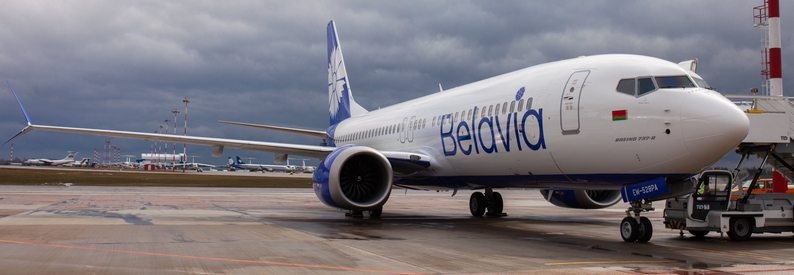EU mulls sanctions on Belavia, others over migration crisis

The European Union is considering imposing new sanctions on Belavia (B2, Minsk National) and other carriers connecting Minsk National with destinations in the Middle East, including Turkish Airlines and flydubai, as Belarus ramps up its efforts to bring migrants to the Polish border.
Three unnamed European Union diplomats told the Reuters news agency that a new round of sanctions could be imposed by the bloc early next week, possibly during a November 15 meeting of the bloc’s foreign ministers. The sanctions may target multiple Belarusian officials and state-owned companies, including Belavia. Once the flag carrier is sanctioned, international lessors could be forced to withdraw their aircraft from Belarus. However, The Guardian reported that discussions were ongoing as to whether the sanctions would affect existing leases or just ban new ones.
In their most extreme form, the punitive measures could severely curtail Belavia’s operations as it leases the bulk of its aircraft – 21 out of 30 – with the majority sourced from EU-based lessors, including six B737s from Ireland’s AerCap, one B737-300 from Romania’s Carpatair, four E175s and three E195s from Denmark’s Nordic Aviation Capital, and one B737-800 each from Ireland’s SMBC Aviation Capital and Thunderbolt Aircraft Lease. Belavia’s leased fleet also comprises one B737-8 from Air Lease Corporation, two B737-800s from Altavair, one B737-800 from Merx Aviation Finance, and another -800 from an undisclosed lessor. The airline’s owned operational aircraft (excluding VIP aircraft operated for the government) are one B737-300, three -800s, one E175, four E195s, and three E195-E2s, the ch-aviation fleets ownership module shows.
Ireland’s Department of Transport and Department of Foreign Affairs held a meeting with lessors on October 27 to discuss potential sanctions on Belavia.
Lithuania, one of the countries most affected by the migratory pressure orchestrated by the Belarusian government, has been calling for sanctions on Belavia since late August 2021. The airline is currently banned from overflying the EU, along with all other Belarusian carriers, but is not subject to specific sanctions affecting its ability to enter contracts with EU entities.
Meanwhile, European Commission President Ursula von der Leyen has said sanctions could also target other carriers carrying migrants from the Middle East to Minsk.
“The EU will explore how to sanction, including through blacklisting, third-country airlines that are active in human trafficking,” she said on November 8.
Blacklisting would effectively prevent these airlines from operating to the European Union.
“Another thing is to send a message to airlines that now are actually bringing people from any other country to Belarus and bringing them with the intention to migrate that they are under the European radar. We are seeing them, and this is not ok,” Lithuania’s Foreign Minister Gabrielius Landsbergis told the media.
The ch-aviation capacities module shows that foreign airlines operating scheduled flights to Minsk include Aeroflot (28 weekly rotations), Turkish Airlines (10), flydubai, UTair (seven each), Azimuth (four), Georgian Airways, Nordwind Airlines, S7 Airlines, Severstal Aircompany, Uzbekistan Airways (two each), and Kankakee (one). Other airlines, including Syria’s Cham Wings Airlines, run charter flights to Minsk.
Turkish Airlines, flydubai, and Aeroflot did not respond to ch-aviation’s request for comment.
The political crisis between the EU and Belarus began after a contested election in August 2020 saw incumbent President Alexander Lukashenko re-elected amid a wave of ensuing violent protests, which were violently suppressed. The crisis escalated in May 2021, when Belarus forced an Ryanair B737-800, en route from Athens Int’l to Vilnius, to divert to Minsk and arrested two dissident journalists onboard. During summer 2021, Belarus began orchestrating migration from various Middle Eastern countries and subsequently forcing migrants and refugees to cross into Poland, Lithuania, and Latvia. The scale of the crisis has been growing and reached a peak on November 8.
